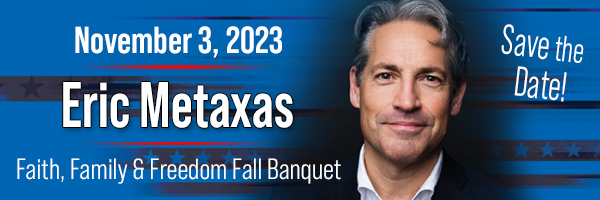What’s To Be Done?
My mentor, when I became the leader of a pro-life organization, told me that it was not enough to inform Christians regarding the issues at stake in the abortion battle; I had to give them something to do or they would become frustrated and inactive. As I have listened to conservatives address the multiple threats the Left poses to America and our liberties, I find myself frustrated by the lack of options they present.
On one hand, there are a multitude of organizations and politicians asking for donations to “save the country;” but with the potential of scams being so real, knowing which requests are legitimate and which are making a difference is very difficult to determine. Contributing to an organization one is comfortable with is a start, but wisdom would suggest that America’s problems are such that more is required of us than merely making a donation. But at some point, if a person hears only how bad things are but is provided no course of action, he may grow weary and go back to whatever he was doing.
I understand the dearth of suggestions. The Left has gained such a stranglehold on so many of America’s core political and cultural institutions that things appear virtually hopeless. It does seem that there is very little an individual can do. However, such defeatism must not be permitted to shut down our efforts to oppose and overcome the Left’s agenda.
So, what is to be done?
First, Trust in God. By this, I am not referring to the trite and silly offering so many make of “have faith!” No, genuine trust in God requires an understanding of God, His nature, sovereignty, wisdom, and grace. So often His ways are, as a theologian would express it, inscrutable-beyond our understanding. We who have enjoyed the blessings of liberty want to see those blessings continue indefinitely, especially for our posterity. However, Scriptures are clear that God will one day destroy all earthly kingdoms and establish His own, with His Son on the throne. There is much we do not know of events between now and that great day, but one thing is clear: the world will be in the grasp of tyrannical powers by the time the Son of God makes His appearance to claim Earth’s throne. It takes no genius to see how perilously close we are to such a scenario at this moment.
Which leads us back to the point: we must learn what trusting God really means. An important part of it is accepting that what we desire may not be His will! He is not our genie in a bottle to give us our desires. He has an infinitely wise and eternal plan for the world, and He will carry it to completion. His will may include the end of America as we know it sooner than we like. It may include persecution for those who love and honor Him. On the other hand, it may include a revival and revitalization of the nation for an unknown duration!
On what basis would God bring about such a revival? That is the question that none can answer. We simply do not and cannot know that. What we do know is that God offered Israel numerous opportunities to repent of their sinful rebellion and return to Him, even when it seemed all was lost. Because He is a gracious God and loves mercy, He may turn what appears to be an inevitable end of America into another “Great Awakening.” As one theologian noted, “God is a God of the cliff-hanger.” It is safe to say that He delights to “snatch victory from the jaws of defeat.”
Thus, I would suggest that the nation needs an authoritative call to repentance from every preacher, every pulpit, and every Christian. As it was so often in both Old and New Testament times, sin is rampant and glibly tolerated. Violence dominates the headlines, and God is scorned on every hand. No honest person can deny the similarity between the culture of today and that of Noah’s time when God noted that “every thought and intent of their hearts was only evil continually.” It is sobering to recall that Christ stated that as it was in the days of Noah, so it would be when He returned!
Another major hurdle in the process of preparing America for God’s blessing is that we are in this predicament in the first place largely because of apathy on the part of America’s Christians. We must stir ourselves into action. Slothfulness has never been a virtue and allows the vile and wicked to prosper and succeed. In the political arena, for example, it is said that only a fraction of professing Christians vote. If this is true, simply stirring up the lackadaisical will go a long way toward changing the political landscape, assuming those professing faith are genuine and will vote their consciences.
Someone has said that “If Christ were coming back tomorrow, I would plant a tree today, because He said, ‘occupy ‘til I come.’” A primary responsibility each of us has towards God is to faithfully do what He has told us to do, and that would include exposing and opposing wickedness. In America we have this call upon us first as Christians, but secondarily as good citizens. We citizens are, by the design of the U.S. Constitution, the actual government. All that happens in America is done under our authority, and thus we must be involved!
Therefore, I suggest the following:
1.) Be constantly in prayer. “Be anxious for nothing, but in everything by prayer and supplications, with thanksgiving, let your requests be made known to God.” Philippians 4:6. God is sovereign overall and works in conjunction with the prayers of His people to accomplish His will.
2.) Do not allow yourself to be pressured to conform to the thinking or conduct of the world, “And do not be conformed to this world, but be transformed by the renewing of your minds. . . .” Romans 12:2. This means that we are to resist the corrupting influence of immorality, dishonesty, crudeness, pride and all ungodliness that has become normative for American culture, especially as it is promoted by Hollywood. Stop allowing the filth and nihilism of the Left to infect your mind and the minds of your children!
3.) Speak up and resist the open wickedness. “And have no fellowship with the unfruitful works of darkness, but rather expose them.” Ephesians 5:11. Because “the wicked flee when no man pursues,” we can accomplish much good by simply pointing out the wickedness of our culture and calling it what it is! It is also our right and responsibility to vote, and to do so intelligently. Be an informed voter and vote according to biblical principles. Also, be bold and encourage other Christians to take their biblical and constitutional responsibilities seriously and vote, too!
4.) Protect the vulnerable and powerless, such as children, the unborn, and their mothers. “Deliver those who are drawn toward death, and hold back those stumbling to the slaughter.” Proverbs 24:11. “You shall not afflict any widow or fatherless child.” Exodus 22:22. From a nation created to “promote the blessings of liberty” to the future generations, America has degenerated into a nation that preys upon the young and helpless. We must be their defenders! This includes removing children from public schools which inculcate children with every kind of vice and evil.
5.) The stakes for America and her children are so high that we must no longer allow our concern for what others think of us hinder our involvement. The only One whose view of you matters is Jesus Christ, and He calls you and me to action!
This is by no means a comprehensive list of the things you and I might do to make a difference. While we are called to patience and to give people the benefit of the doubt when we do not know their motives, there is no longer any doubt as to the evil intentions of the Left! They truly represent all that is opposed to Godliness and goodness, and no longer even attempt to hide their wicked intentions. Therefore, let us “fight the good fight of faith,” as Paul said, and place our futures safely in the hands of the Loving Creator who “loves us and gave Himself for us.”
There is no longer any room for spectators in the arena of public affairs.



 Leftists believe that “gender” is fluid and changeable. In fact, some on the far left believe that there are more than fifty “gender” options.
Leftists believe that “gender” is fluid and changeable. In fact, some on the far left believe that there are more than fifty “gender” options.